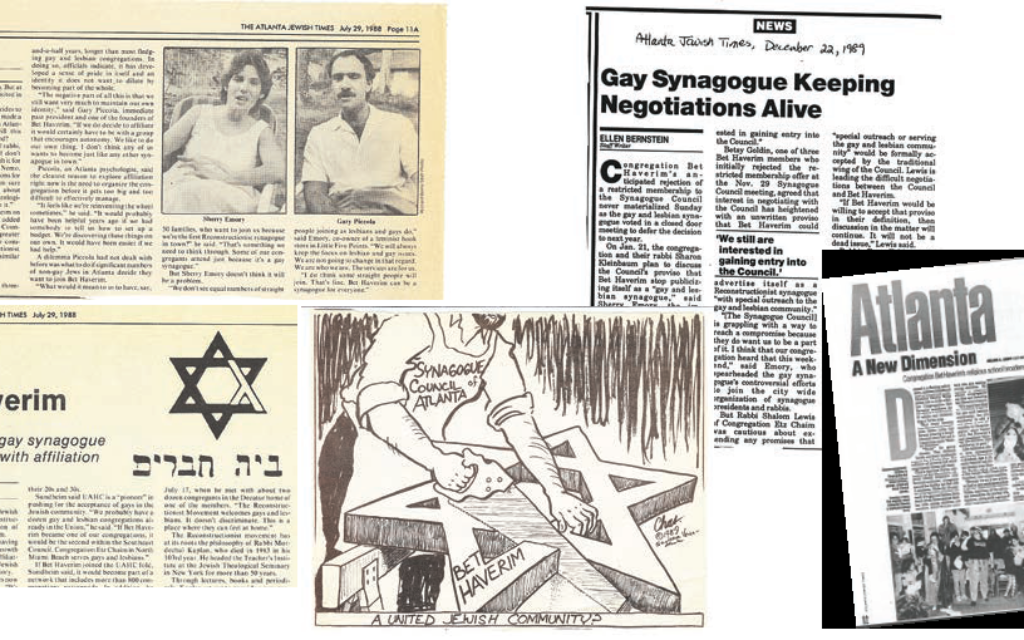Bet Haverim to Celebrate 30-Year Journey
Congregation Bet Haverim is celebrating three decades as Atlanta’s first gay and lesbian synagogue with a multimedia presentation about its origins Sunday night, May 1.
The occasion is a bittersweet reminder for Michael McNeir-Clark, the only survivor of the shul’s four original founders.
“Increasingly during the 1980s, there was a growing sense of urgency: Don’t whine; fix it. Don’t put things off; there might not be a tomorrow,” McNeir-Clark told the Atlanta Jewish Times by email.
Get The AJT Newsletter by email and never miss our top stories Free Sign Up
The creation of Bet Haverim — Secretary of State Max Cleland certified the articles of incorporation June 24, 1986 — followed soon after the emergence of the AIDS epidemic and its devastating consequences. Gary Piccola and Robert Needle, two of McNeir-Clark’s co-founders, died of AIDS complications within a week of each other in 1989.
The congregation was at first ostracized, and its members were identified in official records solely by their initials. Newsletters were sent out in plain brown envelopes. Bet Haverim was denied permission to join the Synagogue Council of Greater Atlanta, ostensibly because it lacked a full-fledged rabbi.

Ruth Anne Davis, who joined Bet Haverim early on, remembers there were disputes about recognition as a real synagogue. “The Jewish community created a synagogue council, and we were not welcome, so that was a big brouhaha, and it came down to the issue of identity. There were some outside of our community who struggled with that.”
When Bet Haverim reapplied for council membership, it was told it had to drop its tagline about serving gays and lesbians to be included. The congregation refused, and the resulting acrimony led to the council’s dissolution, eventually bringing about change.
The prevailing attitude toward the gay community improved as lesbians and eventually heterosexuals, including couples with children, started joining Bet Haverim.
“We were created because the world wasn’t an inclusive place, and I think the beauty of Bet Haverim now is even though it doesn’t really have that gay and lesbian identity anymore — that’s kind of morphed, but the whole world has morphed,” Davis said. “The world is a place that is more inclusive and can celebrate differences rather than fear them.”
The synagogue’s religious school opened in 1995 with a mere 10 students; there are now 125. The congregation, which for most of its existence gathered in private houses or rented spaces, now owns a building on LaVista Road in Toco Hills, where it has operated since October.
Despite the difficulties, the creation of CBH was not considered a daunting task, McNeir-Clark said. “If other groups in other cities had done it, why not us? And those other synagogues helped us put things together so we weren’t reinventing the wheel.”
He added that the founders’ main concern was for people to feel welcomed back into the Judaism of their pre-gay childhoods, when sexist language was the rule. “At the time, very little work was being done on nonsexist liturgy.”
The first heterosexual family to join Bet Haverim, in the mid ’90s, was Avrum and Gayene Weiss and their two small children. “We joined for the same reason everyone else joined: It was an incredibly haimish, welcoming place,” Weiss said. “It wasn’t a political statement and didn’t have anything to do with us being straight; it was just a fabulous synagogue. We went to High Holidays, and I was so moved, I started to cry. … A lot of our liturgy is about oppression and suffering, and I think when you are in a roomful of people who live it, it feels different. It’s not abstract or theoretical.”
Jeri Kagel, a feminist lesbian who wrote the synagogue’s articles of incorporation, worried about heterosexuals altering the character of the congregation.
“I would not want to say no to anyone who for whatever reason is disenfranchised, whether it’s their faith or they’re an interracial couple or just someone who didn’t feel honored. … I didn’t want to do to them what had been done to us, but the concern was, for me, I didn’t want us to become invisible to gay people. I wanted us to still be visible, whether in our marketing (or) our name. I wanted gay Jewish people to very easily find us,” Kagel said.
“All the straight people who joined us were very clear and very supportive,” she said. “It was wonderful, actually, and I do think some of them kind of held the mantle for those that came after them and who were aligned with what we really were. It was great; it’s still great.”
The May 1 event is billed as “In the Beginning: A Story of Courage and Compassion” and is being presented by Andy Segal, a documentary producer formerly with CNN.
“It’s just amazing to realize that it’s been over 30 years,” McNeir-Clark said.
What: Congregation Bet Haverim’s 30th anniversary
Where: 2074 LaVista Road, Toco Hills
When: 7 p.m. Sunday, May 1
Registration: Free, but seating is limited; congregationbethaverim.org/cbh30.





comments